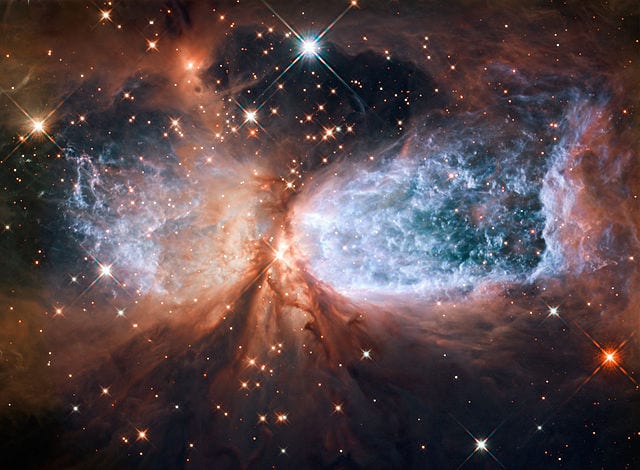
“Explicit_Atheist” came onto my blog, commenting underneath my article, Miracles, Materialism, & Premises: Dialogue w Atheist. I replied. His words will be in blue.
*****
Empiricism is grounded in the historical record of success versus failure. Science relies on empirical methods because they are the only methods that have been successful.
I didn’t claim that this wasn’t the case (though I deny the exclusivistic “only”). You’re simply talking past what I wrote. This is usually the case:
1. The Christian or other sort of non-materialist notes that empiricism must start with unproven, non-empirical axioms. In other words, the claim that empiricism is the only form of knowledge or only dependable one is self-defeating and incoherent.
2. The empiricist-only person (usually an atheist) merely reiterates that empiricism is successful in observing reality and in underlying science (neither notion being the slightest bit challenged or denied by thinking, educated Christians).
Every independent adult relies on empirical decision making everytime we go from the bedroom to the kitchen to bathroom to the place of work and back. When our decisions impact our ability to survive those decisions are made on a best fit with the available empirical basis, otherwise we would not survive.
Yes of course. No one is denying that.
Empiricism is anything but circular, it is unavoidably and strongly anchored in the indefeatable and essential pragmatic foundation of success.
I don’t claim that empiricism per se is circular. It’s simply one philosophy among many and can be established in a non-circular fashion (which I accept myself, being a huge admirer of science). Rather, my claim is that it is circular if it is claimed to be the only knowledge: as if there is no such thing as logic, philosophy, mathematics, experience, intuition, religion, etc.
The words of mine that you cite above were in a particular context: an exclusive claim of this sort. My dialogue partner claimed: “I have come to accept the modern scientific assumption that everything that we can observe can be explained through the examination of natural forces.”
Even this sentence is logically circular, since it isn’t empirical and is a philosophical axiom describing an alleged state of affairs in the actual universe. A universal positive is just as impossible to prove as a universal negative.
People who abandon empiricism always do so selectively, only in those contexts where they can be factually wrong without undermining their ability to survive. But this is inconsistent, it is a double standard, because we have every reason to think that empirical evidence is the ONLY way that the universe reliably communicates to us answers to questions about how the universe functions.
There you go making sweeping philosophical, non-empirical claims about exclusive empiricism again: apparently blissfully unaware that you are doing so. Philosopher Henry Folse of Loyola offers a very good analysis of the larger debate about empiricism and epistemology.
The operation of the universe is non-intuitive and counter-intuitive. So when people claim to obtain such answers without relying on empirical methods they are invariably replacing facts with their own fictions. We are very good at creating fictions, but to find non-fiction we need to rely less on intuition and imagination and more on empirical evidence.
This is non-controversial as well. The “operation of the universe” is a question of physics; hence of science and empirical methods in observing it. No one is questioning that. Yet at the level of hypothesis and axioms underlying them, there is non-empirical speculation in science as well.
Science cannot escape non-empirical elements. Logic and mathematics are two of those: neither is empirical knowledge, and both involve unproven axioms. And they are both fundamental to science. But that’s not all.
Thomas Kuhn (1922-1996): (Jewish) philosopher of science and author of the hugely influential work, The Structure of Scientific Revolutions, wrote in his book, The Copernican Revolution: “[M]odern scientists inherited from their medieval predecessors … an unbounded faith in the power of human reason to solve the problems of nature.”
Eminent physicist Paul Davies (as far as I can tell, an Einstein-like pantheist, but not a theist) makes the basic, introductory-type observations in this regard:
[S]cience has its own faith-based belief system. All science proceeds on the assumption that nature is ordered in a rational and intelligible way. You couldn’t be a scientist if you thought the universe was a meaningless jumble of odds and ends haphazardly juxtaposed. . . .
. . . to be a scientist, you had to have faith that the universe is governed by dependable, immutable, absolute, universal, mathematical laws of an unspecified origin. You’ve got to believe that these laws won’t fail, that we won’t wake up tomorrow to find heat flowing from cold to hot, or the speed of light changing by the hour. . . .
Clearly, then, both religion and science are founded on faith — namely, on belief in the existence of something outside the universe, like an unexplained God or an unexplained set of physical laws, maybe even a huge ensemble of unseen universes, too. For that reason, both monotheistic religion and orthodox science fail to provide a complete account of physical existence.
This shared failing is no surprise, because the very notion of physical law is a theological one in the first place, a fact that makes many scientists squirm. Isaac Newton first got the idea of absolute, universal, perfect, immutable laws from the Christian doctrine that God created the world and ordered it in a rational way. Christians envisage God as upholding the natural order from beyond the universe, while physicists think of their laws as inhabiting an abstract transcendent realm of perfect mathematical relationships. (“Taking Science on Faith,” New York Times, 11-24-07)
Philosopher Alfred North Whitehead (1861-1947) also saw this clearly 85 years ago:
In the first place, there can be no living science unless there is a widespread instinctive conviction in the existence of an Order Of Things. And, in particular, of an Order Of Nature . . . The inexpugnable belief that every detailed occurrence can be correlated with its antecedents in a perfectly definite manner . . . must come from the medieval insistence on the rationality of God . . .
My explanation is that the faith in the possibility of science, generated antecedently to the development of modern scientific theory, is an unconscious derivative from medieval theology. (Science and the Modern World, reprinted by Free Press, 1997, pp. 3-4, 13)
Loren Eiseley (1907-1977), an anthropologist, educator, philosopher, and natural science writer, who received more than 36 honorary degrees, and was himself an agnostic in religious matters, observed:
It is the Christian world which finally gave birth in a clear articulated fashion to the experimental method of science itself . . . It began its discoveries and made use of its method in the faith, not the knowledge, that it was dealing with a rational universe controlled by a Creator who did not act upon whim nor inference with the forces He had set in operation. The experimental method succeeded beyond man’s wildest dreams but the faith that brought it into being owes something to the Christian conception of the nature of God. It is surely one of the curious paradoxes of history that science, which professionally has little to do with faith, owes its origins to an act of faith that the universe can be rationally interpreted, and that science today is sustained by that assumption. (Darwin’s Centenary: Evolution and the Men who Discovered it, New York: Doubleday: 1961, p. 62)
***
Photo credit: This image from the NASA/ESA Hubble Space Telescope (12-15-11) shows Sh 2-106, or S106 for short. This is a compact star forming region in the constellation Cygnus (The Swan). A newly-formed star called S106 IR is shrouded in dust at the center of the image, and is responsible for the surrounding gas cloud’s hourglass-like shape and the turbulence visible within. Light from glowing hydrogen is colored blue in this image. [Wikimedia Commons / Creative Commons Attribution 4.0 International license]
***












